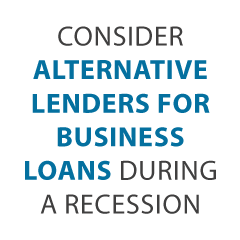
How to Choose Between PayPal Loans, Square Loans, or Fundbox Loans For Your Business
It can be hard to get a business loan. This is especially true if you are applying for loans from a traditional bank. Sometimes alternative lenders are a better option. You may not realize that companies like PayPal and Square offer loan options for their customers. There are also companies, like Fundbox, that require you to be a customer with them first. These are not banks, so they are referred to as alternative lenders. How do you decide if PayPal loans, Square loans, or Fundbox loans right for your business?
Are Loans from PayPal, Square, or Fundbox Easy Business Loans?
Getting a business loan is not always easy. It can take a long time to find one that is right for your business. This is partially due to the fact the requirements vary widely between lenders. The number of requirements vary as well.
Sometimes you not only need a good credit score, but also collateral, a minimum time in business, and minimum average revenue. Not all businesses meet all of these requirements at once, making it hard to qualify.
Other Options
There are alternative lenders, however, that make things a little easier, even if they aren’t exactly easy business loans. They may have less stringent requirements or rely on things other than collateral or credit score. Fundbox, PayPal, and Square are just a few examples.
Find out why so many companies use our proven methods to get business loans.
PayPal Working Capital Loan
If you have a business account with them already, you can get PayPal loans. No personal guarantee is required, and they do not do a credit check. Instead, loan amounts and eligibility depend on your sales via the platform. The maximum loan amount depends on your account history with the company.
To be eligible, you must have a Premier or Business account with them for 90 days or more. In addition, if your account is Premium, you must have at least $20,000 in annual sales with them. If it’s a business account, you must have at least $15,000 in annual sales on the account. You also have to pay off any existing loan with them before you can get another one.
Since payments are automatically deducted as a percentage of each sale through the account, the amount you pay each day varies with your sales volume. As a result, the more you sell, the more you will pay on the loan that day.
You’ll make no payments on days without sales, but there is a minimum repayment requirement every 90 days. Depending on the loan terms you choose, you must pay at least 5% or 10% of your total loan amount (loan + the fixed fee) every 90 days.
The 5% minimum applies to loans estimated to take 12 months or more to repay, based on your business’ past sales through the company and other factors. The 10% minimum applies to loans estimated to be repaid within 12 months.
Are PayPal Loans Right for Your Business?
If your sales volume is strong enough to keep up with repayment and not put your business at risk, it could be a great funding opportunity. It’s probably not something you should open a account with them for on it’s own, but if you already have one it is definitely an option to keep in mind.
Loans from Square
You can also get loans through Square if you have a Square account. Similar to PayPal loans, applying will not affect your personal credit score. Loan eligibility is based on a variety of factors related to your business, including its payment processing volume, account history, and payment frequency.
Loan amounts range from $300—$250,000. You’ll get a customized offer based on your business’s card sales through Square. There is no interest, just an ongoing flat fee.
The fixed fee is the difference between the total amount you owe and the initial loan amount. It will never change, regardless of how quickly or slowly you repay the loan. It automatically deducts until your loan is fully paid.
Like PayPal loans, daily payments fluctuate with sales. On days with higher sales, you will pay more than on days with lower sales. You must pay a minimum of 1/18 of the initial balance every 60 days.
Square doesn’t require collateral for business loans of $75,000 or less. For loans over $75,000, they take a security interest in your business assets. They will file a UCC statement with the Secretary of State where your business is organized. There is no personal guarantee.
Is a Square Loan Right for You?
If you work with Square and need less than $75,000, you don’t even need collateral. That can be a great option. However, if you need more than $75,000, the required UCC statement may be a turn off.
Find out why so many companies use our proven methods to get business loans.
Fundbox
If you do not already work with either of the other two, Fundbox may be a better option. Cash flow financing is easy with Fundbox. They just want to know about your cash flow when deciding whether to fund your business. They will connect directly to your online accounting software, and that’s all you need to do.
Fundbox offers a revolving line of credit rather than term loans. Amounts range up to $100,000. They will auto debit your weekly payment from your bank account. The minimum personal credit score requirement is lower than that of most traditional lenders as well.
You pay in equal installments over the course of a 12 or 24 week plan. Available credit replenishes as you pay, and there is no penalty to repay early.
To qualify, your business must be based in the US and you need to have a 600+ personal FICO score. Additional requirements include:
- $100,000+ in annual revenue
- A business checking account
- Ideally 6 months or more in business
Are Any of These a Good Option for Your Business?
That’s the real question, right? How do you know which one to choose? If you already have a relationship with PayPal or Square, and you qualify, then a Square or PayPal loan may be a good option. Unless you would prefer a line of credit, then you may want to consider Fundbox.
Find out why so many companies use our proven methods to get business loans.
Of course, if you do not have a relationship with the other two, Fundbox it is. If you aren’t already using one of the payment processing companies, the lending options alone aren’t really a reason to start. Still, they could play a factor in a decision between the two if you are considering one or the other.
Why Choose one of These Options Over Traditional Funding?
The main reason is the lower credit score requirements, or lack of credit score requirement at all. Also, the fact that collateral isn’t really an issue unless you are trying to borrow more than $75,000 from Square. These aren’t the only options however. Credit Suite has a number of funding options to fit almost any business. We can help you find the best fit for your specific needs.
The post How to Choose Between PayPal Loans, Square Loans, or Fundbox Loans For Your Business appeared first on Credit Suite.




